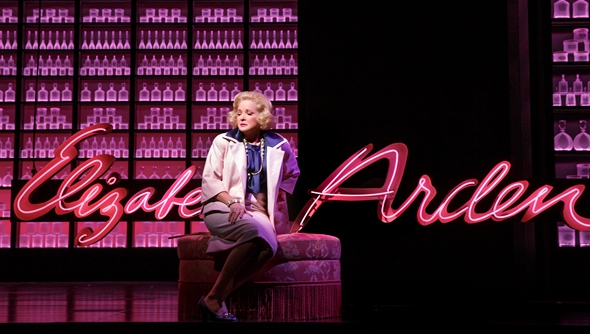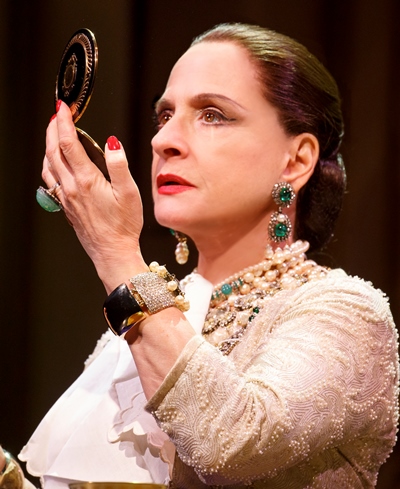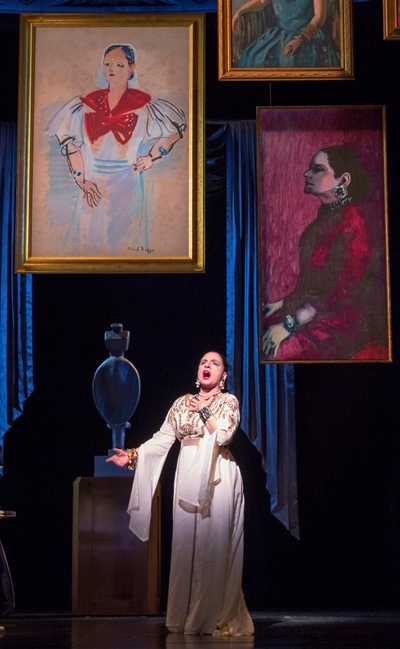‘War Paint’ at Goodman: Arden and Rubinstein clash in musical battle for cosmetic queenship
Review: “War Paint,” music by Scott Frankel, lyrics by Michael Korie, book by Doug Wright. Goodman Theatre thru Aug. 21. ★★★
By Lawrence B. Johnson
To put – what is the phrase? – the best face on it, the new musical “War Paint,” now in its world premiere run at the Goodman Theatre, is a guilty pleasure, a gossip magazine yarn set to music and legitimized chiefly by the stellar performances of Patti LuPone and Christine Ebersole.
For theater-goers lured by the prospect of some juicy dishing, this story of the decades-long rivalry between makeup purveyors Helena Rubinstein and Elizabeth Arden doubtless will have its charms. But “War Paint” is a show mainly about the magic of surface appearances, and only in part does it go much deeper than that.
Based on Lindy Woodhead’s book by the same title, “War Paint” the musical boasts a wealth of good songs (music by Scott Frankel) with clever lyrics by Michael Korie — the same duo that created the hit musical “Grey Gardens,” which also starred Ebersole. Those lyrical pausing points generally offer insightful musings on character, often in the form of credible self-examination. But from early on, the more complex and sympathetic portrait is that of Rubinstein (1872-1965), a Polish-born Jew whose existential struggle against prejudice resonates to the core of LuPone’s multi-dimensional performance.
 Like Rubinstein, Ontario native Elizabeth Arden (1878-1966) rose by her own gifts and grit to become that rarity of her time, a hugely successful female entrepreneur. She essentially parlayed the color pink and striking little ceramic product containers – the envy of Rubinstein – into a marketing coup. Ebersole is nothing short of radiant as the clear-sighted, strong-willed Arden, determined to stake out a high-profile place in the world – and do it under her own name.
Like Rubinstein, Ontario native Elizabeth Arden (1878-1966) rose by her own gifts and grit to become that rarity of her time, a hugely successful female entrepreneur. She essentially parlayed the color pink and striking little ceramic product containers – the envy of Rubinstein – into a marketing coup. Ebersole is nothing short of radiant as the clear-sighted, strong-willed Arden, determined to stake out a high-profile place in the world – and do it under her own name.
Which brings us to the men behind the scenes: Arden’s husband Tommy Lewis (John Dossett), whose marketing acumen is crucial in the brand’s ascendancy, and Harry Fleming (Douglas Sills), a loyal friend to Rubinstein who fills the same role as promoter extraordinaire. In a remarkable twist of fate – or perhaps historical drama – conflict within the respective camps eventually sends the two men across the battle front to serve in the same capacity on the opposite side.
Dossett and Sills make good soldiers, as patient as they are long-suffering. That said, over the course of the show’s dramatic arc, their contention with first one woman and then with the other becomes too loud for too long to keep its edge. And besides, what are we really talking about here? Two very rich corporations hustling make-up. For this to take on any gravitas, we would need to get under the protagonists’ skin. This happens with Rubinstein, not so much with Arden.
To spin a line from the composer Gustav Mahler describing himself, Rubinstein comes across as soul twice alienated, as a Pole in America and a Jew in the world. Hers is a textured character in the play, and LuPone peels down through every layer of it in a sober and serious but also honestly vulnerable way. In the song “Forever Beautiful,” as she contemplates various portraits of her by celebrated artists, LuPone’s Rubinstein reflects on her mortality and the essence of her that will endure. It is the consummate moment of the show.
There’s something vaguely reminiscent of the movie “Legally Blonde” in the depiction of Arden. Ebersole’s Lizzy is charming, and as earnest as she is exuberant — qualities that come together when the actress applies her agile voice to the affecting second-act, career summing-up song “Pink.” But we don’t feel in Arden’s rose-tinted world the same precariousness, the same deep-rooted anxiety and hence human frailty that permeates Rubinstein’s every scene.
In many respects, Arden and Rubinstein run their fiercely competitive race stride for stride, decade upon decade even through the challenging years of World War II, both of them resolute in their conviction that cosmetics is an art form that should be reserved for those who can afford it. But I came away with the odd sense that I’d just observed two quite different images: one of a complete woman, wounds and all; the other a rouged cut-out likeness.
The production, directed by Michael Greif with choreography by Christopher Gattelli, is ambitiously theatrical, both in the sense of eye-popping company numbers and sheer coloristic glitz. Pink is both Arden’s hue and her watchword, and the stage is awash in it.
Designer David Korins’ sets — posh cosmetic centers, an upscale restaurant, an ordinary bar — and Kenneth Posner’s evocative lighting provide critical underpinnings to the story’s tone and flow. And Catherine Zuber’s costumes are the stuff of magazine covers.
Related Link:
- Performance location, dates and times: Details at TheatreInChicago.com
Tags: Catherine Zuber, Christine Ebersole, Christopher Gattelli, David Korins, Douglas Sills, Elizabeth Arden, Helena Rubinstein, John Dossett, Kenneth Posner, Michael Greif, Michael Korie, Patti LuPone, Scott Frankel





1 Pingbacks »